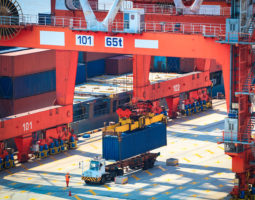Adam Hill: EU Tariff Relief Signals New U.S. Trade Tone, Continued Focus on China

Adam Hill, President and COO of Scarbrough Global
The more things change with the European Union, the more they stay the same with China. So says Adam Hill, President and COO of Scarbrough Global.
Hill, a logistics industry veteran and international trade enthusiast, spoke his mind on the recent EU tariff truce and what it means for the U.S. trade relationship with China.
“(The United States) doesn’t seem to be moving a lot on the China front. But we seem to be moving a lot in other places,” Hill said. “Previously trade policy was simpler whereas now it’s more nuanced. I don’t know which move is right — it’s just different.”
The Biden administration recently agreed to suspend tariffs on a ream of EU goods. Opting for a bilateral solution has set a new tone for American trade policy. According to Hill, however, the differing approach to Europe points to the same goal: countering China.
“The past administration used a very singular approach for dealing with China. You can like the stance or not like the stance — that’s not what it’s about,” Hill said. “This (current administration) is a little bit more interesting because they seem to be taking a larger approach to the same problem.”
Easing tensions and building rapport with Europe show that the Biden administration wants a partner for competing with China. Hill says that it is a different strategy for the same game.
“So, it’s a completely different approach and I’m curious to see how it plays out. In the past, it was a really easy conversation to discuss where (trade policy) was going before — we were pretty antagonistic across the board. Make that assumption and you’d be fine. Now it’s a little different.”
Adam Hill on Why “De-Coupling” from China Won’t Work
Competing with China likely requires more finesse than blunt force. According to Hill, the popular idea of separating completely from the world’s largest exporter does not hold up to scrutiny.
“At the end of the day, China is the world’s factory,” Hill said. “We can never truly de-couple because they simply make so much stuff.”
Adam pointed to companies’ efforts to buy more from places like Mexico as evidence of the challenge. Even with goods that have been assembled in Mexico, China still manufactures most of the individual components. Despite intentions, it remains difficult to avoid buying from China completely.
“They start to dig into it and realize that it’s the same components coming from China and simply shipping to Mexico for assembly. So, the idea of de-coupling doesn’t really exist,” Hill said. “Is some action needed to possibly level the playing field? Sure, though that part isn’t my job. But separating entirely isn’t realistic.”
Adam will continue to share his thoughts and perspectives here monthly. Follow Scarbrough Global on social media or subscribe to our newsletter for regular updates.

